Daily Vocabulary Words: List of Daily Used Words in Leading International Newspapers
Hi there. Welcome to this special section @ Wordpandit.
Our endeavour here is very simple: to highlight important daily vocabulary words, which you would come across in leading newspapers in the country. We have included the following newspapers in our selection:
• The New York Times
• The Washington Post
• Scientific American
• BBC
• The Guardian
• Psychology Today
• Wall Street Journal
• The Economist
We are putting in extensive work for developing your vocabulary. All you have got to do is be regular with this section and check out this post on a daily basis. This is your repository of words that are commonly used and essentially, we are posting a list of daily used words. Hence, this has significant practical application as it teaches you words that are used commonly in leading publications mentioned above.
Visit the website daily to learn words from leading international newspapers.
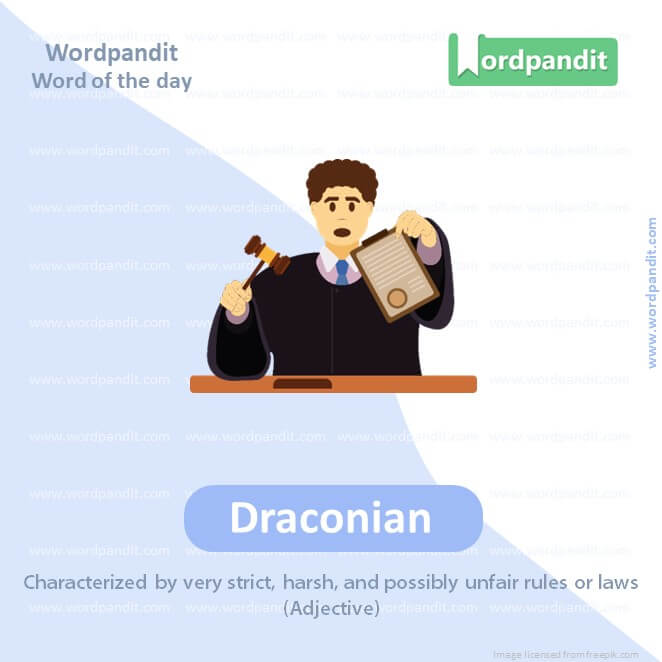
WORD-1: Draconian
CONTEXT: The Conservative party, followed by the usual rhetoric about cutting the numbers in some draconian manner.
SOURCE: Guardian
EXPLANATORY PARAGRAPH: Imagine if your mom or dad made very strict rules, like no talking at all after dinner. These rules are so strict that they seem unfair. That’s what “Draconian” means. It’s used to describe rules or laws that are too harsh.
MEANING: Characterized by very strict, harsh, and possibly unfair rules or laws. (Adjective)
PRONUNCIATION: druh-KOH-nee-un
SYNONYMS: Harsh, Severe, Strict, Rigorous, Uncompromising
USAGE EXAMPLES:
1. The new school policy on homework was considered draconian by many students.
2. To prevent cheating, the exam rules were draconian.
3. Some old laws are so draconian they are no longer used.
4. The company’s draconian dress code required formal attire every day.
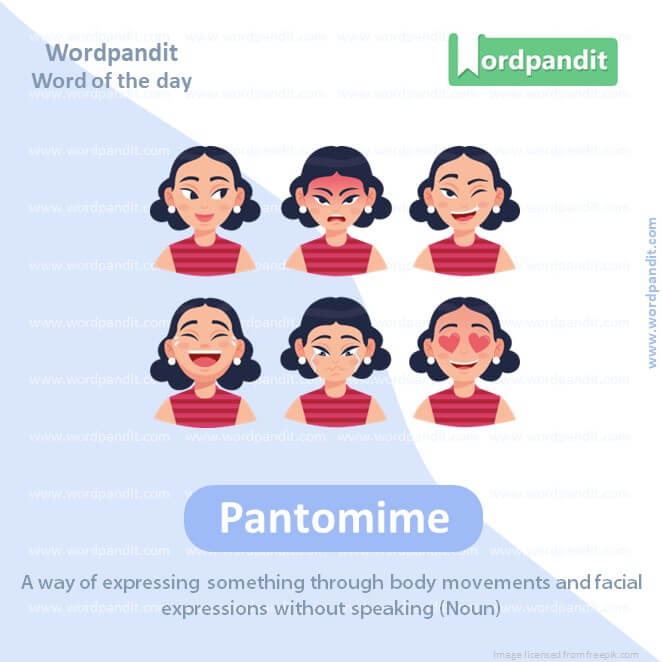
WORD-2: Pantomime
CONTEXT: The government now feigning pantomime horror at their existence.
SOURCE: Guardian
EXPLANATORY PARAGRAPH: Pantomime is like playing charades. It’s when someone acts out a story or message without speaking. They use their body and facial expressions to tell you something.
MEANING: A way of expressing something through body movements and facial expressions without speaking. (Noun)
PRONUNCIATION: PAN-tuh-mime
SYNONYMS: Mime, Charades, Gesture, Acting, Silent Performance
USAGE EXAMPLES:
1. The clown entertained the kids with a funny pantomime.
2. During the game of charades, he did a pantomime of a famous movie scene.
3. She used pantomime to explain the story when she lost her voice.
4. The street performer’s pantomime attracted a large crowd.
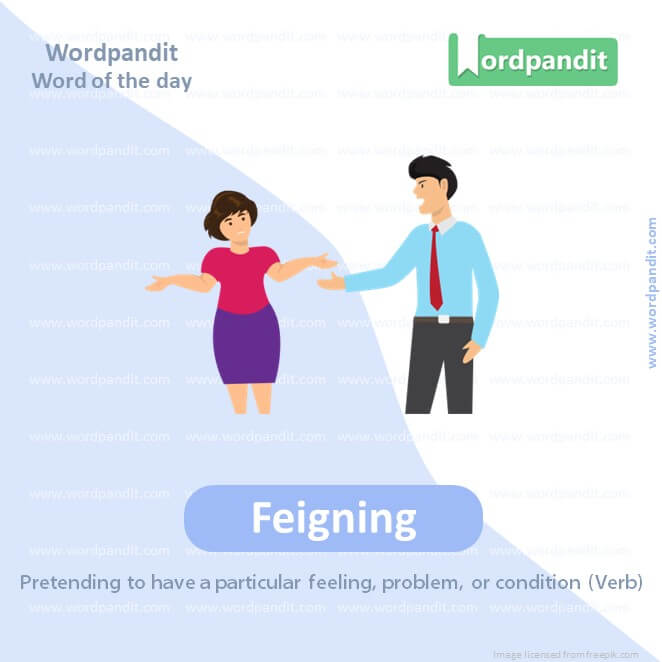
WORD-3: Feigning
CONTEXT: The government now feigning pantomime horror at their existence.
SOURCE: Guardian
EXPLANATORY PARAGRAPH: Feigning is like pretending. If you pretend to be sick to avoid school, that’s feigning. It’s acting like something is true when it really isn’t.
MEANING: Pretending to have a particular feeling, problem, or condition. (Verb)
PRONUNCIATION: FAYN-ing
SYNONYMS: Pretending, Acting, Simulating, Faking, Dissembling
USAGE EXAMPLES:
1. He was feigning illness to avoid going to school.
2. She tried feigning interest in the story, but she was actually bored.
3. Despite feigning confidence, he was nervous inside.
4. He was good at feigning surprise when he already knew the news.
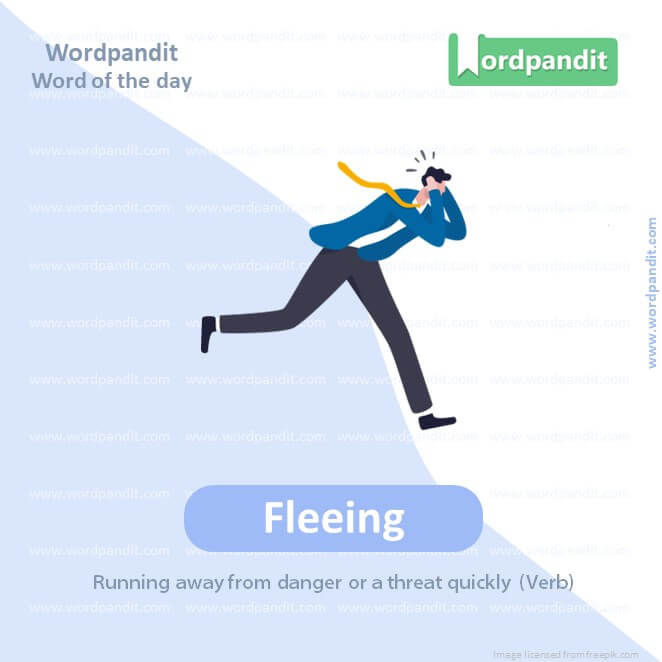
WORD-4: Fleeing
CONTEXT: They were granted leave to work, study, join family or seek sanctuary via compassionate routes like that offered to Ukrainians fleeing an invasion.
SOURCE: Guardian
EXPLANATORY PARAGRAPH: Fleeing means running away from something really fast because you are scared or in danger. Like when you run away from a bee or from someone who is being mean.
MEANING: Running away from danger or a threat quickly. (Verb)
PRONUNCIATION: FLEE-ing
SYNONYMS: Escaping, Running away, Evading, Eluding, Bolting
USAGE EXAMPLES:
1. The rabbit was fleeing from the fox.
2. After hearing the loud noise, everyone started fleeing the building.
3. The thief was fleeing from the police.
4. Birds were fleeing the approaching storm.
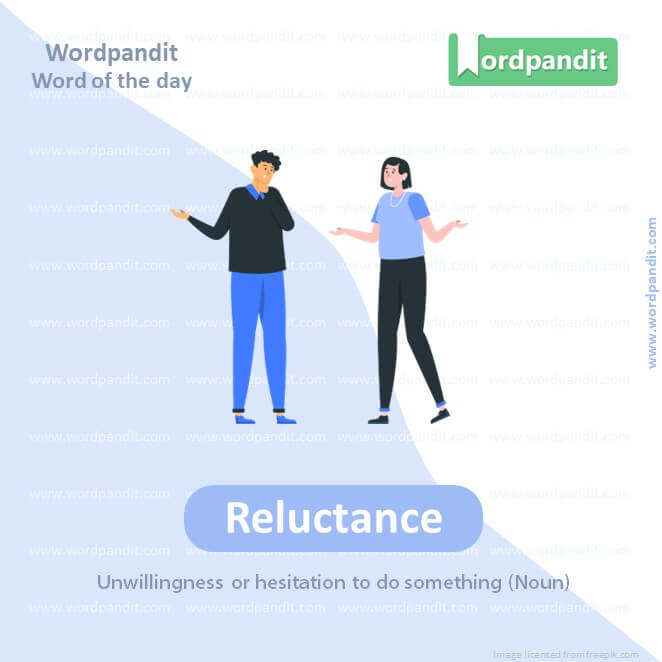
WORD-5: Reluctance
CONTEXT: Ministerial reluctance to defend or explain those decisions has left the Tories in the farcical position of furiously trying to deflect attention instead to their own Achilles heel, namely the small minority who came here illegally.
SOURCE: Guardian
EXPLANATORY PARAGRAPH: Reluctance is when you really don’t want to do something. Like when you don’t feel like cleaning your room or eating vegetables. You know you should, but you really don’t want to.
MEANING: Unwillingness or hesitation to do something. (Noun)
PRONUNCIATION: RE-luk-tuhns
SYNONYMS: Hesitation, Unwillingness, Resistance, Disinclination, Aversion
USAGE EXAMPLES:
1. There was a reluctance among the team to accept the new policy.
2. She showed reluctance to answer the difficult question.
3. Despite his reluctance, he agreed to help his sister.
4. The dog showed reluctance to go outside in the rain.
WORD-6: Obscuring
CONTEXT: While obscuring what small progress Rishi Sunak’s government has actually managed to make.
SOURCE: Guardian
EXPLANATORY PARAGRAPH: Obscuring is like hiding something so it’s hard to see. Like when clouds cover the sun, or when you hide a surprise gift behind your back.
MEANING: Making something difficult to see or understand. (Verb)
PRONUNCIATION: ob-SKYUR-ing
SYNONYMS: Hiding, Concealing, Blurring, Veiling, Clouding
USAGE EXAMPLES:
1. The fog was obscuring the view of the mountains.
2. The report was filled with jargon, obscuring its true meaning.
3. Tall buildings were obscuring the sunset.
4. He was accused of obscuring the facts during the investigation.
WORD-7: Plummeting
CONTEXT: The number of Albanians arriving by small boat plummeting from about 11,500 in 2022 to the end of September, to just 860 in the same period in 2023, suggesting the policy of rapid returns to Albania might have borne fruit.
SOURCE: Guardian
EXPLANATORY PARAGRAPH: Plummeting is like something falling down really fast from a high place. Imagine a rock dropping from the top of a hill, going down, down, down, really quickly.
MEANING: Falling or dropping straight down at high speed. (Verb)
PRONUNCIATION: PLUH-muh-ting
SYNONYMS: Falling, Dropping, Tumbling, Diving, Crashing
USAGE EXAMPLES:
1. The stone went plummeting into the pond.
2. Stock prices were plummeting after the news broke.
3. The skydiver was plummeting towards the earth.
4. Her spirits went plummeting after hearing the bad news.
WORD-8: Dinghy
CONTEXT: But even if ministers had somehow managed to turn around every single dinghy leaving a French beach last year, legal migration would still have hit record levels.
SOURCE: Guardian
EXPLANATORY PARAGRAPH: A dinghy is a small boat. It’s like a tiny boat you can use to go on a pond or near the beach. It’s not big like a ship; it’s just right for a few people.
MEANING: A small boat for recreation or travel, often used for short distances. (Noun)
PRONUNCIATION: DING-ee
SYNONYMS: Boat, Skiff, Rowboat, Small craft, Tender
USAGE EXAMPLES:
1. They used a dinghy to reach the larger boat.
2. The kids were playing in a dinghy by the lakeside.
3. He rowed the dinghy to the shore.
4. They inflated the dinghy for a quick trip across the bay.
WORD-9: Nonexistent
CONTEXT: The price will be public services falling over plus another dismal decade of low to nonexistent economic growth.
SOURCE: Guardian
EXPLANATORY PARAGRAPH: Nonexistent means something is not real or doesn’t exist. Like a unicorn or a dragon. You can’t see them because they aren’t real; they’re nonexistent.
MEANING: Not real, present, or occurring; not existing. (Adjective)
PRONUNCIATION: non-eg-ZIST-uhnt
SYNONYMS: Absent, Missing, Imaginary, Unreal, Void
USAGE EXAMPLES:
1. The chances of winning the lottery are almost nonexistent.
2. He searched for a solution, but it was nonexistent.
3. In the desert, water sources are nearly nonexistent.
4. The concept was interesting but practically nonexistent in real life.
WORD-10: Strenuous
CONTEXT: This emotionally demanding, physically strenuous, and technically skilled job attractive.
SOURCE: Guardian
EXPLANATORY PARAGRAPH: Strenuous is when something takes a lot of energy and effort, like running a race or lifting a heavy backpack. It’s hard work and makes you tired.
MEANING: Requiring or using a lot of physical or mental effort. (Adjective)
PRONUNCIATION: STREN-yoo-uhs
SYNONYMS: Arduous, Demanding, Exhausting, Laborious, Intense
USAGE EXAMPLES:
1. Climbing the mountain was a strenuous task.
2. The doctor advised him to avoid strenuous exercise after the surgery.
3. Preparing for the exam was a strenuous process.
4. Carrying the heavy boxes up the stairs was strenuous work.
vocabulary kit
The gift of language lies not just in the syntax or grammar but majorly thrives on a rich repository of words- the vocabulary. Hence, the importance of vocabulary learning techniques is monumental in language acquisition. These techniques act as catalysts, accelerating the process of language learning, and seamlessly integrating new words into our daily discourse.
The first vital point in mastering vocabulary learning techniques is understanding its purpose. These strategies not just help one in memorizing an array of new words, but also assist in using them appropriately in different contexts. It broadens communication skills and creates a roadmap to better expression of thoughts and ideas.
One of the most commonly employed and impactful vocabulary learning techniques is the usage of flashcards. Flashcards offer visual stimulus which aids in imprinting the word and its meaning more effectively in our minds. Regular practice with flashcards helps cultivate language fluency over time.
Another crucial technique is to learn words in context. This simply means learning a word by associating it with a particular sentence, paragraph or story. This context-based approach remarkably boosts our understanding of the nuanced use of vocabulary in varying scenarios.
Moreover, incorporating digital tools or language learning apps can be an effective method in our vocabulary learning techniques kit. These platforms provide interactive learning experiences with gamified vocabulary exercises, making the learning process greatly enjoyable and engaging.
Finally, regular revision is a cornerstone of these vocabulary learning techniques. Repeated revisions ensure that the learned words do not slip away and rather, become firmly anchored in our memory.
Indeed, vocabulary learning techniques are much more than mere memorization strategies. They nurture linguistic competence, expanding expressive capabilities and fostering effective communication. Hence, investing time in understanding and practicing these vocabulary learning techniques can pay rich dividends in enhancing one’s language proficiency.







